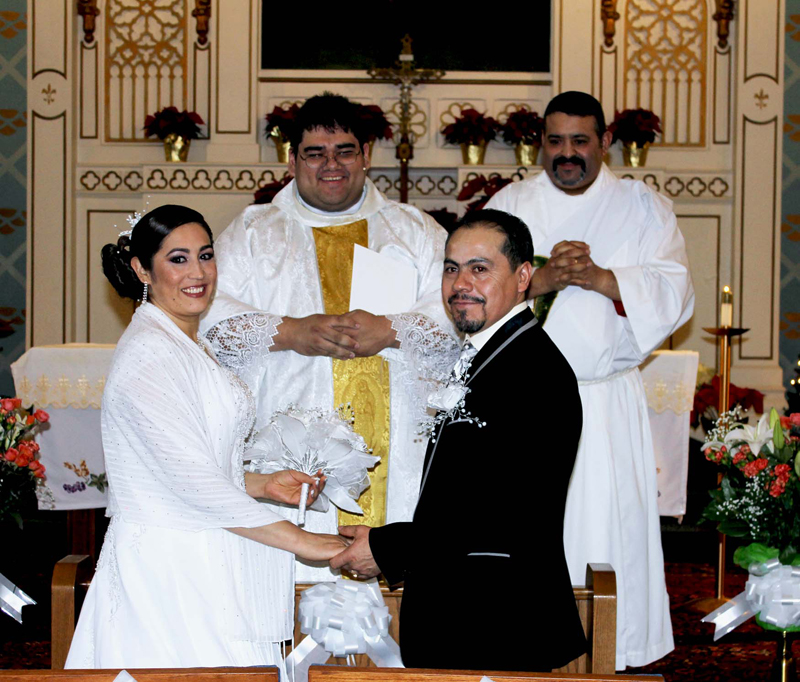
Maria and Erasmo Herrera exchange vows during their wedding Mass at St. Mary Parish in Davenport. Father Guillermo Trevino presided at the Mass on Dec. 31. Deacon Gabriel Guerrero (Maria’s uncle) of the Peoria, Ill., Diocese assisted during the Mass.
By Fr. Joe DeFrancisco, S.T.D.
Toward the end of Vatican Council II, eminent Catholic theologians Bernard Haring and Yves Congar argued persuasively for a reconsideration of a theology of marriage which for centuries reinforced the Jewish laws of Torah: marriage is constituted for the procreation of children. (Deut. 24:1; Gen.1:28)
Both theologians, alongside a large commission of episcopal and theological experts, encountered serious challenges over a lengthy period before completing the Pastoral Constitution on the Church in the Modern World, “Gaudium et Spes.” (1965)
The visionary theologians managed to draw on the wealth of Jewish biblical tradition while breathing into sacramental theology an equally profound mission of couples joined in marriage by the grace of God. In a simple but enlightened statement we read: “marriage is the intimate partnership of life and love which constitutes the married state. This state has been constituted by God and endowed by our Creator with its own laws. This law is rooted in a covenant of two partners who freely give their irrevocable personal consent. The institution of Christian marriage is confirmed by divine law and receives its stability from the same Divine source. Likewise, secular culture recognizes this human act by which couples surrender themselves to each other for the good of each other, for the well-being of future children, and for the good of all humanity. The diverse ends that God envisions for marriage have a profound impact on the development of a human race, on the personal development of the couple and their families, and on the dignity, stability, peace, and the prosperity of the whole human race.” (G.S. 1:48)
This quote from the Pastoral Constitution provides a concise but complete theology of Christian Marriage. The document goes on to re-state: “Marriage is an intimate union which expresses itself as a mutual self-giving of two persons, shared with future children, demanding a total fidelity and unbreakable unity.(G.S. 1:49)
The beautifully developed mission of Christian married couples clearly prioritizes how the progression of this Christ-centered love is to unfold. Christian couples are challenged within the church’s teaching to focus greater emphasis on how the self-sacrifice and maturity of their love is in fact leading each partner closer to Christ and his spouse, the church. Before couples assume the awesome responsibility of bringing children into the world, they are counseled to grow in knowledge, respect, affection and spiritual maturity so that they model within their intimate relationship a union to Christ and his church. Through this union they are able to best teach and form their children into future Christians and wholesome human beings.
These theological images of married life must also be seen in a greater transcendent perspective as well. Jesus offered a metaphor of his life within the future mystical body of the church in Matthew 9:14: The day will come when the Bridegroom (Jesus) will be taken from the Bride (his church). On that day the Bride will fast, for the new wine (Christ’s redeemed people), requires a life within new wineskins (communities of church). The ultimate destiny of God’s holy people is to enjoy an intimate communion of love in God’s Kingdom which Jesus described as eternal heavenly banquet. (Matt.22)
In the Old Testament the Prophet Isaiah foretells the coming of the Messiah as a Messianic wedding banquet (Is. 25) and in John’s Revelation the New Jerusalem shall descend to meet the Bride as she is adorned for her Husband. This shall be the wedding feast of the Lamb. (Rev. 21) Even a cursory exploration of the Gospel narratives reveal the model of married life as the pre-eminent means of defining the nature and goal of our relationship to God as a community of love in and through Jesus Christ.
This is not a “gender-based” image that describes the diverse relationships of spiritual marriage as solely exemplified in the relationship of one man to one woman. The disciples of Jesus were wedded to his incarnate presence as an indestructible bond of love, fidelity and service, both within their personal and private encounters with Jesus and within the community of faith, their church.
Whether single, virginal, religious, monastic or priestly, each baptized Christian is called to experience the incarnate love and communion of Christ within multiple possibilities of relationships. Yet, the diverse forms of states of life are also bound by the one theology of marriage. Christian relationships of committed love are bound by the same divine mandate. Our love relationships must be grounded in what Paul teaches in Ephesians 5. We are to love each other in exactly the way Christ has loved his church, giving up his own life as a means of saving and redeeming all.
Christian marriage and all Christian committed relationships are defined by altruism, self-sacrifice, unconditional love, exclusive marital affection and a lifetime journey that leads those in love to the source of love, Jesus Christ. As the great mystics of the church, like St. Teresa of Avila, describe their graced intimate union with God as a “mystical marriage,” so Christians of all walks of life and in all relationships are invited to this same mystical love.
Finally, our diverse states of life and unique shared love-relationships must live up to Jesus’ expectation of lives poured out in charity, compassion, mercy, forgiveness and self-surrender. It is through Christian married love that the church herself is to be reformed and transformed. Married or committed life within the church must express itself in a pouring out of love for children, for God’s lost children, for the marginalized and rejected of the world and for anyone who suffers for lack of love.
The most meaningful way I know to sum up this reflection is to finish with a part of Jesus’ prayer to his Father in the Gospel of John: Father, I give your people the glory you have given to me, so that they may be one as we are One. The world must know that You sent me and that you have loved them even as you love me. Father they are your gift to me. I wish that wherever I am they may be with me and share my glory. (John 17: 20-26)











